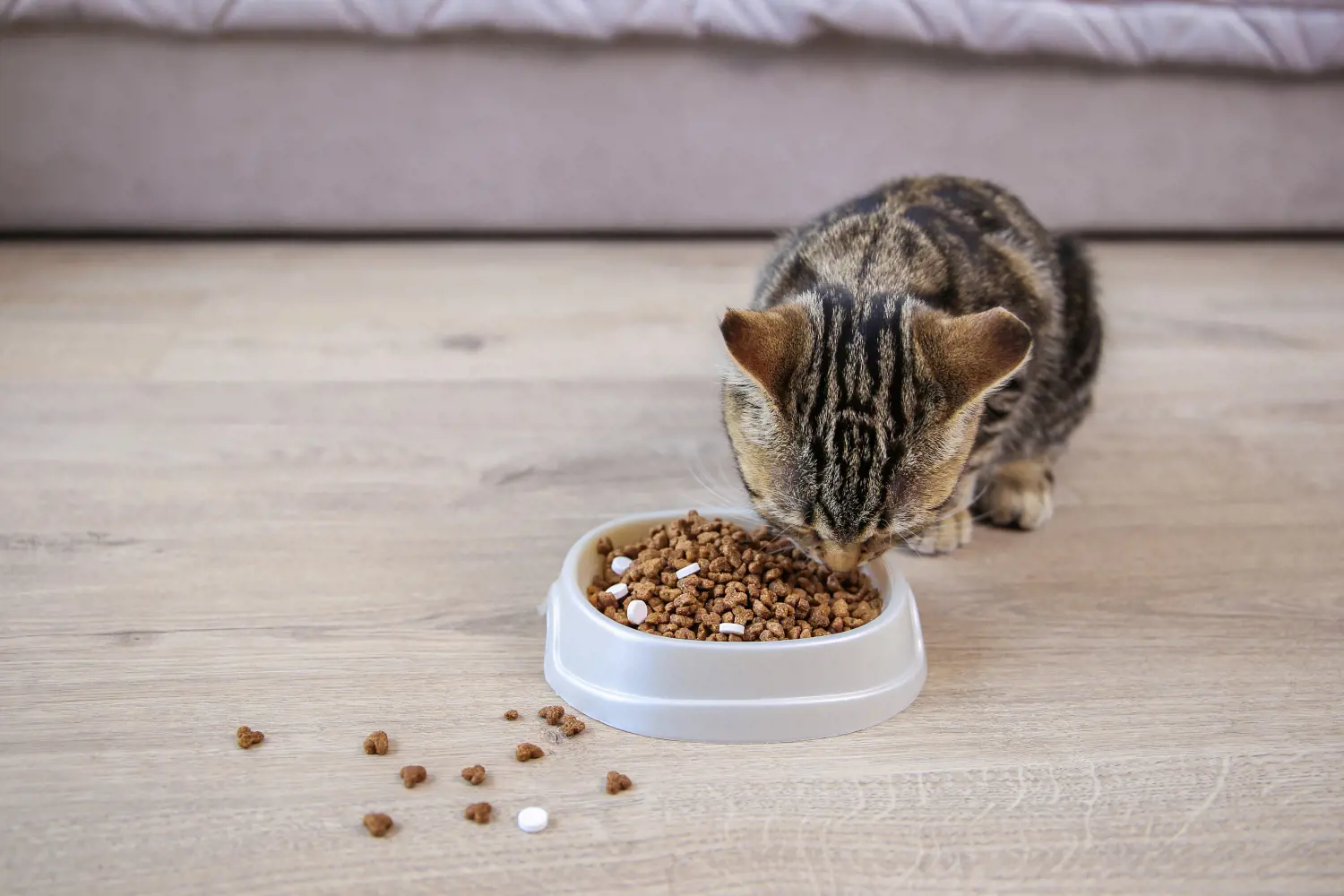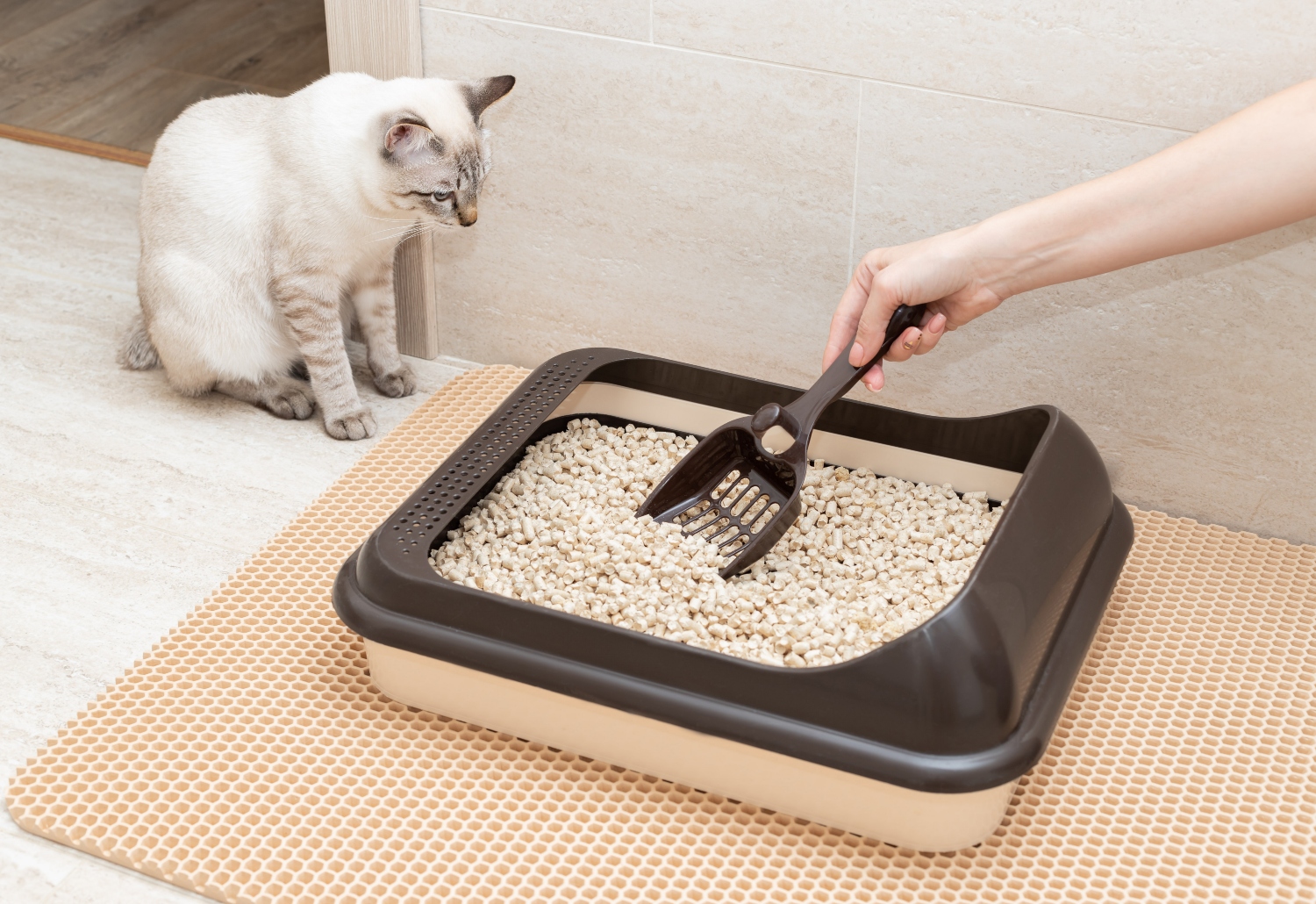How to notice if your cat has worms
21st March, 2023

Cats worms can be harmful to your pet’s health but are easily preventable and treated. Get to know what signs to look for and how to keep the parasites at bay.
If the thought of wiggly worms makes you squirm, you’re not alone! There’s something about the way they move and the slimy feel that makes many of us shudder.
These wriggly creatures aren’t only found in your garden, though. Worms can make your cat their host and take up residence in their intestinal tract – your poor pet!
Luckily, staying on top of worming treatments can help prevent the parasites from moving in. And, if you do forget a dose, your vet can prescribe medication to eliminate them from your cat’s gut.
Not sure what to look for when it comes to symptoms in your pet? We’ve got you covered!
Discover where these parasites come from, the signs of worms in felines and how often you should be treating them.
We’ll also tell you how cat health insurance from Purely Pets can help with getting your pet back to its normal self if they ever fall seriously ill. Although, it should be mentioned that routine worming treatments are not covered by insurance.
What are worms in cats?
Worms in cats are tiny parasites that appear when your kitty accidentally eats their eggs. Yes, they might sound rather unpleasant, and they can be, but they can be prevented by staying up to date with your pet’s worming treatments.
Two main types of intestinal worms exist in cats in the UK:
-
Tapeworm – Just like a piece of tape, these worms grow long and flat, attaching themselves to the wall of your cat’s intestines. Small segments often break off and appear in your pet’s poo.
-
Roundworm – As the most prevalent type of worm, these squirmy white creatures resemble earthworms and can also be spotted when your feline goes to the toilet.
Other types of worms do exist but are rarer or non-existent in the UK. These varieties include:
-
Lungworm
-
Bladder worm
-
Heartworm
-
Liver fluke
-
Whipworm
-
Hookworm
Remember, worming treatments aren’t covered by your cat health insurance, but if you need help paying for the medication, you can speak to your vet about a pet health plan to spread the costs over a year.
The last thing you want is for your mischievous cat to miss a worming treatment and become the parasite’s next host!
If you do suspect your pet has worms, get them to the vet! Quick diagnosis is the key to getting your cat back to normal.
How do cats get worms?
If a cat ingests worm eggs, they’ll become infected, but when are they at risk of ‘snacking’ on these parasites?
-
Got a small kitten? If the mother’s infected, your tiny cat is at risk of catching worms from their milk.
-
If your cat loves to hunt and eat its prey, it could pick up eggs from birds, mice, and rats.
-
Eating another animals poo doesn’t sound very appetising, right? But some cats do it – believe it or not! Unfortunately, ingesting poo or soil when outdoors can also lead to a worm infestation.
-
Is your cat itching a lot? They might have fleas. These blood-sucking pests can also carry tapeworms, meaning your pet could easily swallow an egg or two during their daily grooming session.
How can I tell my cat has worms?
It can be pretty tricky to tell if your cat has worms. Some mogs display no symptoms at all or become seriously ill. Usually, the symptoms will worsen as more and more worms take hold.
The most common signs of worms in cats include:
-
Diarrhoea (sometimes with blood)
-
Vomiting (you might notice worms in the sick)
-
Weight loss
-
Bigger appetite
-
Tar-like faeces
-
Itchy bottom
-
Bloating and pot belly (particularly common in kittens with lots of worms)
-
Dull coat
If the infestation gets worse and you haven’t detected the parasites, you might notice more serious symptoms, like:
-
Lethargy and weakness
-
Dehydration
-
Pale gums and lips (due to anaemia)
Cats are masters at hiding their feelings, so it’s important to get to know what’s normal behaviour for your pet. We’ve got some tips on how to read your cat’s body language so you don’t miss the signs.
When to see the vet
As soon as you notice something isn’t right with your cat, take them to the vet to get a stool test and check for the parasites. They’ll prescribe the best treatment to effectively rid your cat of worms and give you tips on preventing a re-infection.
If the signs are subtle or your feline has only experienced a very slight bout of sickness and you need some advice, why not use our 24-hour vet video service? Protecting your kitty with any one of our cat health insurance plans means you can get quick, professional advice around the clock.
How to treat worms in cats
So, your cat’s got worms, and we’re sure you want to get rid of the squirmy pests as soon as possible! The course of treatment will depend on your pet’s age – here’s a quick rundown of what to expect.
Treating worms in kittens
To make sure the treatment isn’t harmful for your kitten, your vet will prescribe medicine based on their age and weight.
Whether the kitten already has worms or not, they should be wormed at 3 weeks old and then once a fortnight until they reach 16 weeks. After this, they’ll need a top up treatment every 3 to 6 months, or whenever your vet recommends.
Worms aren’t the only risk to your tiny cat. There are various diseases and health concerns that can attack your kitten while its immune system is still developing.
To protect your little ball of fluff against serious medical conditions, you’ll need cat health insurance from the moment you bring them home. At Purely Pets, we can insure your cat from as young as 8 weeks old – contact our team to cover your kitten today.
Looking for more tips to help care for your new addition? We’ve got plenty of advice on how to look after your kitten elsewhere on our blog.
Treating worms in adult cats
Prevention is better than a cure, right? So, as a responsible pet parent, ideally you want to ensure your kitty doesn’t get these nasty parasites in the first place.
In adult felines, a treatment every 3-6 months is usually enough to prevent a serious infection from worms. If your pet is a particularly big fan of hunting and eating its prey, you might want to deworm them more regularly.
In cats with a serious infestation, you might see dead worms in their poo after the first few treatments, but this should disappear as they recover.
Treatments for preventative care aren’t usually covered by cat health insurance but are an essential part of budgeting for cat ownership. If you’re struggling with the costs of ongoing care, ask your vet if they can spread the payments with a pet health plan.
Are there side effects to cat worming treatment?
Although side effects of the medication are very uncommon, some cats may experience:
-
Vomiting
-
Diarrhoea
-
Increased saliva
-
Loss of appetite
These effects usually appear within 24 hours of receiving treatment and should resolve on their own. If your cat seems particularly unwell, get them to the vet or use our 24/7 vet video consultation service if you have cat health insurance with us.
Can my dog catch worms from my cat?
Yes! If you have a dog or any other pets at home, they could easily catch worms from your cat.
Before you give any of your pets worming treatment, speak with your vet. Cats, dogs and other pets each require a different medication – never give your cat and dog the same treatment, or you could be rushing them to vets for a serious illness before you know it!
Can I catch worms from my cat?

Can you imagine having worms wriggling inside you? Well, it can happen if your cat is host to the parasites! To avoid an unpleasant situation like this, you’ll need to stay on top of hygiene by:
-
Cleaning up cat poo as soon as possible.
-
Regularly cleaning and disinfecting their litter tray.
-
Washing your hands after handling the poo or your cat.
-
Encouraging regular hand washing in your children after playing outdoors.
-
Covering up a sandpit if you have one.
Treat your cat for worms every 3 to 6 months and get yourself to the doctor if you suspect you or your children might have caught them.
Worms aren’t the only nasty you can catch from your cat either! Find out what potential diseases your four-legged friend could pass onto you elsewhere on our site.
Can I deworm a cat myself?
Got a cat that dreads going to the vets? Don’t worry! Deworming treatments are simple to use at home. Just make sure you speak to your vet about the best medication for your feline friend. All you need is their weight, and they’ll provide the right dose.
When possible, go for prescription worming treatments – these are a lot more effective than over-the-counter varieties.
There are plenty of de-wormers available without a prescription, but finding the right product can be tough as they vary so much. Off-the-shelf medication is often less effective, too, and you might find your kitten gets an infection despite staying on top of treatments.
How can I weigh my cat at home?
You don’t want to give your cat the wrong dose, so getting their weight right is important to prevent an infection. Follow these steps to get the most accurate reading:
-
Step onto a set of digital scales and note your weight.
-
Pick up your cat gently and support them with both arms.
-
Step onto the scales again and make a note of your combined weight.
-
Finally, subtract your weight from the total to find out how much your pet weighs. Simple!
If your cat doesn’t like being held, you can perform the same technique with their carrier by putting it on the scales by itself and then with the cat inside.
Tips on cleaning your home after a worm infestation
Does your kitten come into your bed for a cuddle? Watch out! If your feisty feline has recently had worms, they could have dropped them all over your home – and that includes in your sheets! So, you’ll want to do everything possible to prevent them from striking again.
Cats Protection have some tips on how best to clean your house after an infestation:
-
Thoroughly clean all bedding, blankets and sheets your pet has touched on a hot wash.
-
Steam clean carpets and use a mild bleach solution or antibacterial cleaner on hard floors.
-
Completely clear out their litter tray and give it a good soak in hot, soapy water.
-
Throw boiling water over any outdoor areas your cat might have used as a toilet – just remember, this will kill eggs but also any plants or grass.
If you use chemical cleaners that could be hazardous to your pet, make sure you air out the room before letting them in or you might be claiming on your cat health insurance for a more serious condition.
What other parasites and pests can infect my cat?
Now you know how to spot a worm infestation and nip it in the bud before it becomes too serious. But these aren’t the only tiny terrors that can make your cat their new home.
Here are a few of the most common cat pests and how to spot them.
Fleas
Every pet parent’s worst nightmare. These itchy little pests multiply in the blink of an eye.
They suck blood from your kitty and their ridiculously fast reproduction rate means they can quickly take over your cat’s body and your home, making it difficult to eradicate them completely once they take over.
As with worms, prevention is best, and you can give your cat regular flea treatments to keep the pests at bay. But what if you miss a dose? Look out for these signs of fleas in your pet:
-
Excessive scratching
-
Bald patches and hair loss
-
Red and irritated spots of skin
-
Thickened skin on ears
-
Dark tiny specs in fur
-
Tiny brown or black insects scurrying around
The RSPCA recommends combing your pet with a fine toothed comb over a white piece of paper. Drop some water on any black marks on the paper, and if they turn red, your kitty likely has fleas.
Speak to your vet about a flea treatment (not included on cat health insurance) and thoroughly clean all their bedding and your home. We’ve got more tips to rid your pets and home of fleas on our blog.
Mites
These external parasites are usually so small you need a microscope to spot them! Some of the more common types include:
-
Ear mites – These pests are extremely common in cats and cause excessive itching particularly around the ears. Luckily, they’re easily treated with drops from your vet.
-
Scabies – Also known as notoedric mange, these mites burrow into your pet’s skin, but you’ll be glad to know it’s fairly rare. Watch for itching along with crusting and scaling of the skin. Your vet can prescribe topical medication as treatment.
-
Cheyletiella – Often called ‘walking dandruff’ because of how they look and move on your pet, cheyletiella causes itching and skin scaling, but is easily treatable.
-
Demodex – These mites live on or in your cat’s skin. Healthy felines will often only have a small amount of these pests, but if your pet is immunocompromised, they can become abundant and cause lots of itching, hair loss and inflammation. Topical and injectable medications are used to kill them off.
Ticks
These larger external parasites are easier to spot, and are more common between March and October, but that doesn’t mean you shouldn’t be wary of them all year round.
How do you spot them? Run your fingers across your cat’s body each day and check for lumps and bumps. They’re often found around a cat’s ears, head, neck and feet. You should see red bumps if they’re there.
Tick bites carry diseases, like Lyme disease, which can be very harmful to your cat, so it’s crucial you remove them immediately.
We recommend picking up a tick removal tool so you can effectively twist the tick off. If you squish them or leave the head in, you increase the risk of disease in your cat.
How can you tell your pet has Lyme disease? Symptoms include:
-
Reduced appetite
-
Lameness
-
Depression
-
Fever
-
Swollen joints and lymph nodes
As long as you catch the disease early on, your vet will be able to prescribe antibiotics. Worried about the cost of vet bills and expensive treatment? Cat health insurance can help with that!
Why choose Purely Pets to protect your cat?

Did you know that however well you look after your feisty feline, they can still succumb to a variety of health issues? Just check out the 5 most common problems here.
At Purely Pets, we understand that your cat is a loved and cherished part of your family and deserves to be protected, which is why we offer 15 levels of cat health insurance to choose from to suit every cat and their pet parents.
Managing your policy is easy through our online portal. You’ll also get access to the 24-hour vet video service for quick, professional advice for your pet whenever you need it.
So, why wait any longer to protect your pet with award-winning insurance? Get in touch with Purely Pets today and keep your cat fighting fit.
Frequently asked questions
Can I use home remedies to treat cat worms?
It’s best not to try any home remedies on your pet. These are unlikely to treat the pests and could even harm your cat in the process.
Can you see when a cat has worms?
For many pet parents, seeing worms present in poo is the first sign. You might spot whole worms, segments or their eggs as tiny white specs. They can occasionally be seen around your pet’s anus or stuck in its fur, too.
How do I know if my cat is free of worms?
While there are no visible signs your cat is worm free, keeping up to date with worming treatments is a good way to know they are probably not a host. You can also ask your vet to check for their presence with a stool test.
How do indoor cats get worms?
Your cat doesn’t venture outdoors to hunt and sees no other felines, so it can’t get worms, can it? Although it might seem unlikely your pet will be hosting an infestation, it’s still possible.
Common household pests like flies and mice can harbour the eggs, so frequent treatment is still important to prevent worms.
Can worms live outside my cat’s body?
Once eliminated from your pet’s body, the worms themselves don’t live long – phew! But the eggs can survive for years! So, whenever you touch your cat or clean their poo, make sure you wash your hands thoroughly.
Helpful Pages
Recent Posts

Why do Pugs lick the air?
02/10/24Pet Insurance Quote
- 98% claims paid *
- Claims paid directly to vets
- 24/7 vet video consultations
- Interest free monthly payments



